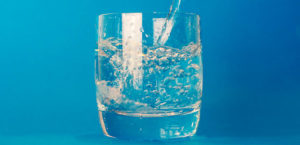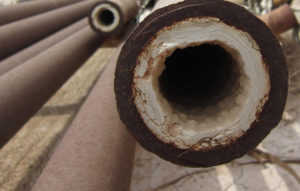We know the term „water hardness“ from the information on the detergent, from discussions about drinking water or from problems with limescale in the household or the company.
In fact, this is a value that indicates the concentration of foreign substances dissolved in water. This means that the proportion of dissolved foreign substances, such as calcium and magnesium, in a litre of water is investigated. In Germany the water hardness is given in °dH (degrees of German hardness). You can convert the hardness untis here.
In North America the water hardness is measured in grains per gallon or in ppm. Normally city water, range in between 6-15 grains per gallon (which corresponds colloquially to a hardness range from soft to moderate) in tap water. In the Mid West a lot of farming is done. It is very common, that every farm has there own well. As due to the long distances, it is not feasable to have a centralized water supply for each and every house.
The bore well water often is full of minerals or iron. The hardness minerals are magnesium or calcium which might build scale in pipes. The result is often very hard water with a hardness of well over 25 grains per gallon. We know places with hard water having more than 100 grains.
Not all water is the same?

When we speak of „water“ in the practical sense, we always mean what comes out of the tap, not in the chemical sense H2O. Tap water differs from region to region. In the cycle of water on earth, it moves through different soils or rock layers. In this way, it absorbs various water-soluble substances (so-called hardness builders) from the ground.
This means that rainwater has a degree of hardness of almost zero. It is pure and particularly soft. The water hardness of tap water then depends on the types of rock it encounters on its way. In regions where the ground consists mainly of limestone or gypsum, it can be removed and dissolved in the water. Here the tap water is also particularly hard water and can build scale in pipes and machines.
What does „hard water“ in the household mean?
First of all: substances such as magnesium and calcium are important for the organism and must be ingested through food. They are contained in drinking water. Hard water is therefore not harmful to health. The term also has nothing to do with the colloquially „calcified“ arteries or joints.

How can I determine the water hardness?
You can find out whether the drinking water in your region is soft, medium or hard from your municipal utility. The information is usually available online. The hardness range is important, for example to estimate the amount of detergent required. The foreign substances contained in the water can cause chemical reactions that influence the washing result.
In addition or if you have your own well, there are suppliers of test strips, with which the water hardness can be determined. For our purposes, however, such an exact determination of the hardness range is not necessary. Our technology does not change the chemical composition of the water. For this reason a test do not help. The hardness is before and after the ring the same.
When you order the Merus Ring, we will provide you with instructions on how to monitor the effect.
